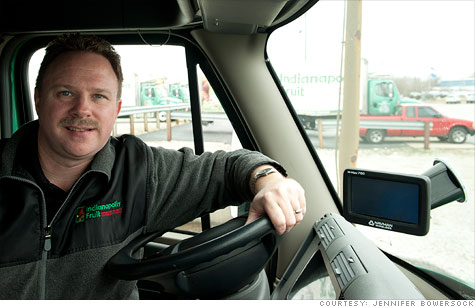Search News

Michael Gilbert, director of logistics at the Indianapolis Fruit Company, ensures truck drivers stay fuel efficient as a way to fight rising gas prices.
NEW YORK (CNNMoney) -- Gas prices are rising fast, and companies are bracing for the impact -- shedding old habits and adopting new technology.
In an effort to cut fuel costs, small businesses have turned to light trucks retrofitted to carry bigger loads and vehicles that can run on biodiesel. Some are even using special GPS devices that let bosses know when employees keep engines running hundreds of miles away.
So far, it's working at Indianapolis Fruit Company, said Michael Gilbert, the delivery company's director of logistics.
The company's headquarters was alerted Thursday when one of its 18-wheelers sat idling for 40 minutes along Interstate 294 just south of Chicago. Within seconds, a written message appeared on the driver's GPS device asking if something was wrong.
The driver phoned in a response, saying, "All I did was stop to go to the bathroom because it just, you know, sometimes takes a little longer than you think."
Gilbert said restroom and lunch breaks are fine, of course. But the anecdote shows Gilbert's biggest challenge: Getting people who've driven the same, inefficient way for decades to change their ways.
"We're trying to educate the drivers on the macroeconomics of what engine idling does," Gilbert said. "They look at 50 minutes a day as, 'Not that big of a deal.' We're trying to teach them that 50 drivers using 50 minutes every day all year is a huge number."
Rising gas prices have caused firms to intensify their efforts. Once-a-day interactions with drivers have grown to four. To reduce the time refrigerated truck doors are left open, shipping crews are now notified when drivers are nearby so they can have crates ready to push onboard.
When Gilbert left FedEx (FDX, Fortune 500) last year to join the 320-employee fruit and vegetable supplier, he aimed to track food shipments as rigorously as he did mail packages. He turned to a small Chicago-based firm, Navman Wireless, for GPS devices to track and manage his fleet.
Many are joining him. Navman co-owner Renaat Ver Eecke said business has boomed in the last two months in light of gas price increases. It booked 1,403 new clients, up 39% from the same time period last year.
Some business owners who lived through the 2008 gas price spike have positioned themselves to quickly retool.
Back then, Brian Mullins was running a Miami landscaping company. When diesel fuel went through the roof, he turned to biodiesel, a blend that's part petroleum, part vegetable oil and part animal fat. He bought the cheaper fuel from local suppliers.
Today he owns Ms. Cheezious -- two gourmet food trucks that serve grilled cheese sandwiches -- and is ready to turn to biodiesel again.
Diesel shot up 20 cents on Monday to $4.29 a gallon. "I'm still using diesel, but I'll probably switch this week," Mullins said.
In Los Angeles, swimming pool management company VivoPools stopped buying large engine trucks in August and recently retrofitted three smaller Toyota Tacoma pickups with camper beds.
"We know we have to make that investment today because over the next five years, we know we're going to make up for it," CEO Willan Johnson said.
Johnson wishes he could buy gasoline in bulk like he does with chlorine. But that option was out of reach for him -- as it is for most small businesses -- because of high upfront costs.
"Like health care, locking in prices would help us plan ahead," Johnson said. ![]()